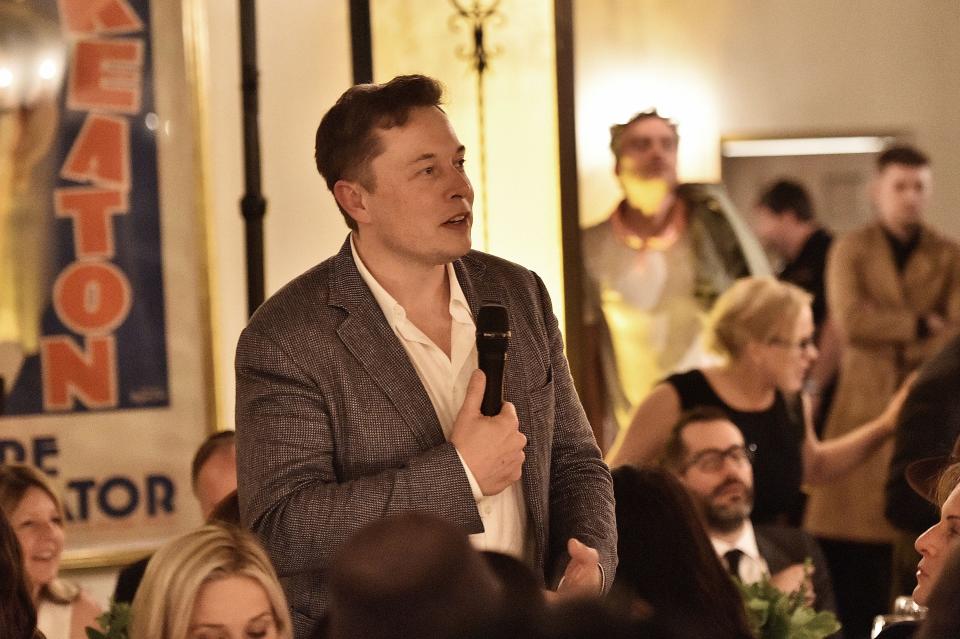AI could forever change our lives, tech experts warn. And it could happen in months
- Oops!Something went wrong.Please try again later.
- Oops!Something went wrong.Please try again later.
- Oops!Something went wrong.Please try again later.
What should keep us up at night?
Six years ago, that was the question that started a slugfest among titans of American high tech, four men who tower above the global economy and above the clouds that obscure the future to the rest of us.
In July 2017, Elon Musk started the melee when he told the National Governor’s Association, “I have exposure to the most cutting edge AI (Artificial Technology), and I think people should be really concerned by it. AI is a fundamental risk to the existence of human civilization.”
Should we cheer or fear artificial intelligence?
Soon after, Mark Zuckerberg scoffed at Musk, the CEO of SpaceX and Tesla.
“I think people who are naysayers and try to drum up these doomsday scenarios – I just, I don’t understand it,” the Facebook CEO said. “It’s really negative and, in some ways, I actually think it is pretty irresponsible.”
Musk retorted with a dismissive pat on Zuck’s head, “I’ve talked to Mark about this. His understanding of the subject is limited.”
Microsoft co-founder Bill Gates came to Zuckerberg’s defense:
“(AI is) on the verge of making our lives more productive and creative.”
But tech billionaire Mark Cuban took up Musk’s side with simply this, “(Artificial Intelligence) scares the s--- out of me.”
That was then.
Everything could change in years, maybe months

On Sunday, journalist and public intellectual Ezra Klein climbed one of the highest peaks in our culture – the pages of The New York Times – to shout that time is speeding up.
AI is already with us, wrote Klein. But its potential for disruption, which could include the cataclysmic, is finally upon us.
We are floating in the still waters of normalcy just before the storm blows in, he warned in a piece headlined, “This changes everything”.
Klein quotes industry leader Paul Christiano, a member of OpenAI, who said in 2022, “The broader intellectual world seems to wildly overestimate how long it will take AI systems to go from ‘large impact on the world’ to ‘unrecognizably transformed world.’ This is more likely to be years than decades, and there’s a real chance that it’s months.”
Artificial intelligence is “the ability of a digital computer or computer-controlled robot to perform tasks commonly associated with intelligent beings,” says the Encyclopedia Britannica. These would include “intellectual processes characteristic of humans, such as the ability to reason, discover meaning, generalize, or learn from past experience.”
US is in a high-stakes AI race with China
Klein noted that he has spent much time with the people developing AI since he moved to the Bay Area in 2018.
“I don’t know that I can convey just how weird that culture is. And I don’t mean that dismissively; I mean it descriptively. It is a community that is living with an altered sense of time and consequence. They are creating a power that they do not understand at a pace they often cannot believe.”
Roughly one in 10 AI researchers said the technology could lead to the extinction of the human race or its severe “disempowerment,” according to a 2022 survey by Oxford University and the Machine Intelligence Research Center, Klein noted.
One in 10.
Writing aid or cheating tool?Professors grapple with impact of ChatGPT
“Would you work on a technology you thought had a 10 percent chance of wiping out humanity?” asks Klein.
We probably could tap the brakes if we wanted to, he explained. However, smart money is pouring into the highly competitive development of AI and we’re in a high-stakes race with China to lead in the technology, he explained.
AI could be used for incredible evil or good
We have not yet imagined all the ways in which AI could change life as we know it. But Klein offers some possibilities:
Non-human companions who become our assistants, gurus and more.
More advanced automated jobs that theoretically put millions out of work.
Developers of lethal weapons and cyberattacks.
Controls over public infrastructure.
Predictive policing.
Judicial sentencing.
Already, groups, such as The Future of Life Institute have formed to channel this powerful technology into constructive uses and away from their most lethal military uses.
They have created videos to provoke our imaginations, such as one showing how drone swarms could be used to target and assassinate political opponents.
What does this technology do to the soul?
AI has enormous potential for good.
As Bill Gates wrote in a book forward, “Think of all the time we spend manually organizing and performing mundane activities, from scheduling meetings to paying the bills. In the future, an AI agent will know that you are at work and have 10 minutes free, and then help you accomplish something that is high on your to-do list.”
Science fiction writers and filmmakers were the first to imagine the impact of this technology. One was Steven Spielberg, who directed the film “A.I. Artificial Intelligence” back in 2001.
AI makes him “very nervous,” he said. “You’re basically taking something you created, and you made, which is the computer, and giving the computer autonomy over your point of view and yourself as the human person.
“The soul is unimaginable and is ineffable. And it cannot be created by any algorithm. It is just something that exists in all of us. And to lose that because books and movies and music (are) being written by machines that we created, and now we’re letting them run with that? That terrifies me.”Phil Boas is an editorial columnist for The Arizona Republic. Email him at phil.boas@arizonarepublic.com.
This article originally appeared on Arizona Republic: AI could forever change our lives within months, experts warn

